小学六年级英语句子复习一
人教PEP版英语六年级上册Unit 1 How can I get there 单元复习-
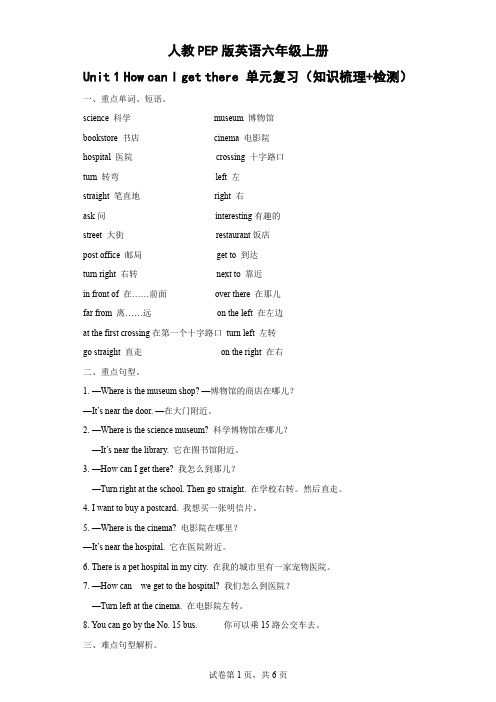
人教PEP版英语六年级上册Unit 1 How can I get there 单元复习(知识梳理+检测)一、重点单词、短语。
science 科学museum 博物馆bookstore 书店cinema 电影院hospital 医院crossing 十字路口turn 转弯left 左straight 笔直地right 右ask问interesting有趣的street 大街restaurant饭店post office 邮局get to 到达turn right 右转next to 靠近in front of 在……前面over there 在那儿far from 离……远on the left 在左边at the first crossing在第一个十字路口turn left 左转go straight 直走on the right 在右二、重点句型。
1. —Where is the museum shop? —博物馆的商店在哪儿?—It’s near the door. —在大门附近。
2. —Where is the science museum? 科学博物馆在哪儿?—It’s near the library. 它在图书馆附近。
3. —How can I get there? 我怎么到那儿?—Turn right at the school. Then go straight. 在学校右转。
然后直走。
4. I want to buy a postcard. 我想买一张明信片。
5. —Where is the cinema? 电影院在哪里?—It’s near the hospital. 它在医院附近。
6. There is a pet hospital in my city. 在我的城市里有一家宠物医院。
7. —How can we get to the hospital? 我们怎么到医院?—Turn left at the cinema. 在电影院左转。
小学英语六年级上册人教版第一单元复习
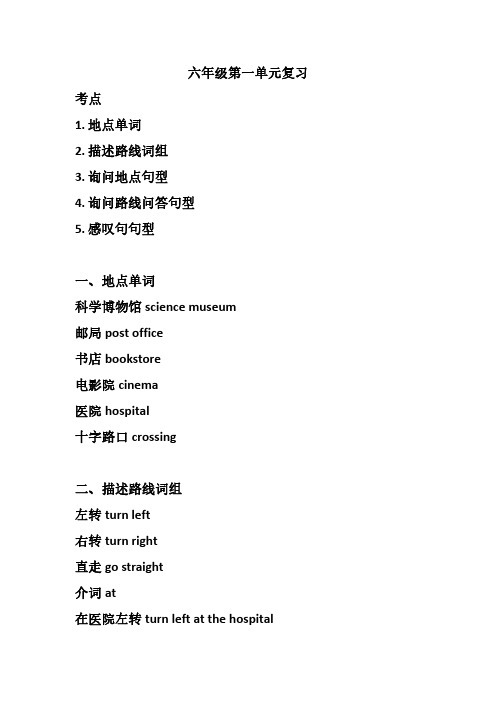
六年级第一单元复习考点1.地点单词2.描述路线词组3.询问地点句型4.询问路线问答句型5.感叹句句型一、地点单词科学博物馆science museum邮局post office书店bookstore电影院cinema医院hospital十字路口crossing二、描述路线词组左转turn left右转turn right直走go straight介词at在医院左转turn left at the hospital在邮局左转turn left at the post office在书店右转turn right at the bookstore在电影院右转turn right at the cinema在十字路口直走go straight at the crossing二、询问地点句型句型问:Where is+地点?答:It's+方位介词+地点.1.医院在哪?在电影院旁边。
Where is the hospital?It’s near the cinema.2.电影院在哪?紧挨着科学博物馆。
Where is the cinema?It’s next to the science museum.3.书店在哪?在邮局的前面。
Where is the bookstore?It’s in front of the post office.三、询问路线句型句型问:How can+主语+get there?How can+主语+get to+地点?答:Turn right/Turn left/go straight+at+地点.1.我们如何到达那儿?How can we get there?2.我如何到达那儿?How can I get there?3.我如何到科学博物馆?How can I get to the science museum?4.我如何到学校?How can I get to school?5.我们如何到达电影院?How can we get to the cinema?6.我们如何到达邮局?How can we get to the post office? 7.我们如何到家?How can we get home?四、感叹句句型句型结构What a/an+形容词+名词!1.多么有趣的电影啊!What an interesting film!2.多么棒的博物馆啊!What a great museum!3.多么漂亮的房间呀!What a nice room!。
新人教pep版六年级英语下册unit1复习总结

新人教pep版六年级英语下册unit1复习总结一、单词巩固:(写出下列形容词的比较级)一、重点句子。
1.I’m taller than this dinosaur.我比这只恐龙高。
2.Some dinosaurs are bigger than houses.Some are smaller than our schoolbags.一些恐龙比房子大。
一些比我们的书包小。
3.询问体重的问句:--How heavy is it?它体重多少?--It’s five tons.它5吨。
4.询问鞋子的尺码:--What size are your shoes?你穿多大号的鞋?--What are your shoes?你穿多大号鞋?--My shoes are size35.我穿35号的鞋。
5.询问高度:--How tall is it?它有多高?--Maybe4metres.可能4米。
--I’m1.65metres.我身高1.65米。
--Size7.7号。
6.询问体重:--How heavy are you?你体重多少?--I’m48kilograms.我体重48千克。
课堂操练:按要求完成句子。
1.I am46kilograms.(对画线部分提问)1.Ⅰwear size37in China.(对画线部分提问)2.My friend is9years old.(对画线部分提问)3.Peter is shorter than Sam.(对画线部分提问)5.I am stronger than my brother.(改为一般疑问句)三、语法专项:形容词比较级的规则变化:单音节词和少数双音节词:(1)一般在词尾加“er”。
例如:tall—taller,young younger,old一older,small smaller。
(2)以字母“e”结尾的词,加“r”。
例如:fine—finer,nice-nicer,late-later。
六年级上册英语重点单词重点句子总复习

PEP六年级上册四会单词及句子复习Unit1第一单元四会单词:Sciencemuseum科学博物馆postoffice邮局bookstore书店cinema电影院hospital医院crossing十字路口turnleft向左转gostraight直走turnright向右转四会句子:1--Whereisthemuseumshop博物馆的商店在哪儿--It`snearthedoor在大门附近2--Howcanwegetthere我们怎么到那儿--Turnleftatthebookstore到书店左转Unit2第二单元四会单词:onfoot走路bybus乘公共汽车bytaxi乘出租车byplane乘飞机bysubway乘地铁byship乘船bytrain乘火车slowdown减速stop停下wait等go走四会句子:1--Howdoyoucometoschool你怎么来学校的--Usually,Icomeonfoot通常我走路来2IntheUSApeopleonbikesmustwearone.在美国骑自行车的人必须戴头盔;3 Don’tgoattheredlight别闯红灯;4Imustpayattentiontothetrafficlights我必须注意交通信号灯Unit3第三单元四会单词:visitmygrandparents拜访我的外祖父母seeafilm看电影takeatrip远行gotothesupermarket去超市dictionary词典comicbook连环画书wordbook单词书postcard明信片四会句子:1--Whatareyougoingtodotomorrow你明天打算做什么--I’mgoingtohaveanartlesson.我要上美术课2 We’regoingtodrawsomepicturesinRenminPark.我要到人民公园去画画3--Whereareyougoing你们打算去哪儿--We`regoingtothecinema我们打算去电影院4Whenareyougoing你们什么时候去Unit4第四单元四会单词:dancing跳舞singing唱歌readingstories看故事书playingfootball踢足球doingkungfu打功夫cooksChinesefood做中国菜studiesChinese学习汉语doeswordpuzzles猜字谜goeshiking远足四会句子:1--WhatarePeter`shobbies彼得有什么爱好--Helikesreadingstories他喜欢读故事2--DoesheliveinSydney他住在悉尼吗--No,hedoesn`t不,他没有3--Doeshelikedoingwordpuzzlesandgoinghiking他喜欢猜字谜和远足吗--Yes,hedoes是的,他喜欢Unit5第五单元四会单词:factoryworker工厂工人postman邮递员businessman生意人policeofficer警察fisherman渔民scientist科学家pilot飞行员coach教练四会句子:1--Whatdoeshedo他是做什么的--Heisabusinessman.他是商人2--Wheredoeshework他在哪儿工作--Heworksatsea.他在海上工作;3--Howdoeshegotowork他怎么上班--Hegoestoworkbybike.他骑自行车上班;Unit6第六单元四会单词:angry生气的afraid害怕的sad悲伤地worried担心的happy开心的seeadoctor看医生domoreexercise做更多的锻炼takeadeepbreath深深吸一口气wearwarmclothes穿暖和的衣服counttoten数到十四会句子:1 They’reafraidofhim.它们害怕它2Thecatisangrywiththem.这只猫生它们的气;3What`swrong怎么了Yourfatherisill.你爸爸生病了;4Heshouldseeadoctorhismorning.他今天早上应该去看病;5Don`tbesad.别伤心PEP六年级上册常用句型问路和指路-Whereis+地点名词……在哪儿-It’s+介词短语.在……;-Howcanwe/Igetto...我们/我怎么到……呢-Turnleft/right./Gostraight./Youcangoby+交通工具.左/右转;直走;/你可以乘坐……去那儿;询问并回答对方来或去某地的交通方式:Howdoyoucome/goto+地点你/你们怎么来/去……I/Wecome/goto+地点+bybike/onfoot….我/我们骑自行车/步行……来/去……询问对方某个时间打算做某事的句型及答语:-Whatareyougoingtodo+表示将来的时间你……打算去做什么-I’mgoingto+动词原形+将来的时间.我打算……去做……询问对方打算去哪儿的句型及答语:Whereareyougoing+表示将来的时间你……打算去哪儿I’mgoingto+表示地点的名词.我打算……去….询问对方打算什么时候去做某事的句型及答语:Whenareyougoing+动词原形你打算什么时候去……Iamgoingto+动词原形+将来时间.我打算……去……;注:begoingto+动词原形=will+动词原形询问别人的爱好并作出回答:Whatis/are某人的hobby/hobbies……有什么爱好=Whatdo/does某人like主语+like/likes+动词-ing+其他.……喜欢做……=某人的hobby is/are….某人的爱好是...;助动词does引导的一般疑问句及答语:Does+第三人称单数主语+动词原形+其他……做……吗-Yes,he/she/itdoes.No,he/she/itdoesn’t.是的,他/她/它是;不,他/她/它不是;询问他人的职业并作出回答:Whatdo/does+主语+do......是做什么的=Whatbe+某人主语+be动词+a/an+职业名词.……是……询问他人的工作地点并作出回答:Wheredo/does+主语+work……在哪儿工作主语+work/works+表示地点的副词或介词短语;……在……工作;询问他人怎么去上班:Howdo/does+主语+gotowork主语+gotowork+bybike/onfoot….询问他人正在做什么及描述正在做某事:What+be+某人+doing主语+be动词+动词-ing+其他….正在…Don’t祈使句:Don’t+动词原形+其他.不要……Don’t+be+形容词+其他.不要……表达对某人或某事的关心:What’wrongwith+某人描述及提问某人的感受的句型:How+do/does某人+feel主语+feel/feels+表示感受的形容词+其他.=主语+be动词+表示感受的形容词+其他.……是……用should来给对方提建议及征求意见的句型:Whatshould某人+do某人should+动词原形.你应该…..语法复习一、现在进行时态3种变化规律1.直接加ing:do—doing draw—drawing cook—cooking answer—answering read—reading listen—listening fly—flying sing—singing play—playing2.去掉末尾的e加ing:write—writing dance—dancing take—taking have—having make—making ride—riding dive—diving3.双写末尾字母加ing:get—getting run—running swim—swimming sit—sitting put—putting你正在干什么WhatareyoudoingI’mansweringthephone.他/她/它正在干什么Whatishe/she/itdoingHe’s/She’s/It’s …他她、它们正在干什么WhataretheydoingTheyare…看到like或likes后面的动词要加上ing二、一般将来时态begoingto/will+动词原形表示一般将来时的时间状语有:thismorning,thisafternoon,thisevening,tomorrow,tonight,thisweekend,ontheweekend,nextweek,nextmonth,nextyear,nextweekend.例:今晚你将要做什么Whatareyougoingtodothisevening—I’mgoingtothecinema.I’mgoingtovisitmygrandparents.你将什么时候去Whenareyougoing—I’mgoingat7:10.你将怎样去呢Howareyougoing—I’mgoingbybus.今天下午你将要去哪里Whereareyougoingthisafternoon—I’mgoingtothebookstore.你将要买什么呢WhatareyougoingtobuyI’mgoingtobuyacomicbook.你将和谁一起去WhoareyougoingwithI’mgoingwithmyparents.三、第三人称单数后面的动词要加s或es1.一般情况加s,如:read—reads;live—lives;play—plays;sing—sings2.动词末尾以s,x,ch,sh或部分以o结尾的加es记住课本中出现的这几个:watches,teaches,goes,does,washes,passes3.辅音字母+y结尾的把y变i再加es,如:fly—flies;study—studies4.特殊情况:have--has5.第三人称单数包括:he;she;it;myfather/friend;Amy/Hangzhou等一个人名或地名;例如:Helikesdrawingpictures.Sheworksinacarcompany.Itcomesfromtheclouds.Myfathergoestoworkonfoot.LiLeioftenplayscomputergamesafterlunch.6.一般疑问句记住:前面助动词加了es,后面动词就不变化了;如:DoessheteachEnglishDoesyourpenpalliveinHangzhou四、不定冠词a和an的用法a用于辅音因素开头的单词前;an用于元音因素开头的单词前;记住课本中出现的要用an的单词:anactor;anactress;anartist;anengineer;anaccountant;anEnglishbook;anorange;anapple;anoldwoman五、动词变化为表示职业或人的单词1.动词后面加er:work—worker;teach—teacher;sing—singer;TV report—TVreporterclean—cleaner2.动词后面加or:act—actor;doctor3.末尾以e结尾的直接加r:write—writer;dance—dancer;drive—driver4.动词后面加ist:art—artist;tour—tourist5.职业男女有区别的:警察policeman—policewoman;演员actor—actress六、8个疑问词which哪一个what什么when什么时候where哪里whose谁的why为什么how怎么样who谁七、人称代词和物主代词I—my-mine我—我的-我的you—your-yours你;你们—你的;你们的-你的;你们的he—his-his他—他的-他的she—her-hers她—她的-她的we—our-ours我们—我们的-我们的they—their-theirs他们/她们/它们—他们的/她们的/它们的他们的/她们的/它们的八、can后面加动词原形WhatcanyoudoIcancookthemeals.Hecanflykites.Shecan playtheviolin.弹小提琴PEP小学英语六年级上册各单元作文一、介绍你和家人上学或上班的方式Igotoschoolonfoot.Mysistergoestoschoolonfoot,too.Mybrothergoestoschoolby bike.Myfathergoestoworkbycar.Mymothergoestoworkbybike.二、看图,说说你怎样去电影院Igotothecinema.Istartfromhere.Gostraightforfiveminutes.Thenturnleftatthe library.Gostraightforoneminute.Thelibraryisontheright.三、读读下周末你和朋友的计划I’mgoingtohaveabusyweekendwithmyfriends.OnSaturdaymorning,wearegoingtog oshpping.OnSaturdayafternoon,wearegoingtothepark.OnSundaymorning,wearego ingtogofishing.OnSundayafternoon,wearegoingtoflykites.Wewillbehappy.四、说说你和你家人的爱好;Ilikeflyingkites.Myfatherlikesdiving.Mymotherlikesplayingthepipa.Mybroth erlikesridingabike.Mysisterlikeslisteningtomusic.MyfriendJohnlikesflying kites.Amylikescollectingstamps.ZhangPenglikesplayingfootball.ChenJielike sridingabike.五、介绍你一家人的职业和上班地点和方式;Myfatherisateacher.Heworksinaschool.Hegoestoworkbycar.Mymotherisanaccoun tant.Sheworksinabank.Shegoestoworkbybus.六、写一封信给你的笔友,介绍你一家人的情况;DearAmy,MynameisSarah.I’m13.I’mtallandthin.Ilikeswimming.Myfatheris40.He’stal landstrong.Helikesreadingbooks.Heisworker.Heworksinafactory.Hegoestowork bycar.M ymotheris39.She’sshortandthin.Shelikescooking.Sheworksinabooksto re.Shegoestoworkonfoot.Yours,Sarah七、看图介绍图中这个人的情况;HeisBen.Heis26.Heisapoliceman.Hegoestowork bybus.Helikesplayingtheviolin.Helikesgoingfishing,too.。
冀教版小学六年级英语第一单元重点句子总结

六年级英语第一单元重点句子总结1.今天我没有作业。
I don't have any homework today.2.我也没有。
I don't either.3.我可以打开电视机吗?May I turn on the TV?4.你是怎样打开它的?How do you turn it on?5.你是怎样把声音调低的?How do you turn it down?6.你喜欢这个电视节目吗?不!我认为他是个不受欢迎的演员。
Do you like this TV show? No! I think he's a bad actor.7.你最喜欢的节目是什么?What is your favourite show?8.在恐龙时代里你最喜欢哪位演员?What actor do you like best in Dinosaur Days?我喜欢黄颜色演员胜过蓝颜色演员,但我最喜欢绿颜色演员。
I like the yellow actor better than the blue actor, but I like the green actor best.9.他认为这位演员是最好的演员。
He thinks this actor is the best actor.10.这是一架钢琴。
丹尼正在弹钢琴。
This is a piano. Danny is playing the piano.11.你会演奏什么? 我会拉二胡。
What can you play? I can play the erhu.12.钢琴,吉他,小提琴和二胡演奏音乐。
The piano, guitar, violin and erhu make music.13.唱歌也是音乐。
Singing is music, too.14.我喜欢小提琴。
但我更喜欢吉他。
我最喜欢钢琴。
I like the violin. But I like the guitar better. I like the piano best.15.这就是我弹奏它的原因。
人教版(PEP)六年级英语上册期末复习知识点

人教版(PEP)六年级英语上册期末复习知识点人教版(PEP)六年级英语上册复习知识点Unit 1 How can I get there?主要单词:science科学museum博物馆post office邮局bookstore书店cinema电影院hospital医院crossing十字路口turn转弯left 向左ask问interesting有趣的Italian意大利restaurant餐馆pizza 比萨饼street大街;街道get到达GPS全球卫星定位系统feature特点follow跟着far较远的tell告诉习惯搭配turn left向左转turn right向右转go straight直行in front of...在...前面next to挨着go straight直走near the park在公园附近on Dongfang Street在东方大街上post office邮局pet hospital 宠物医院Beihai Park北海公园Italian restaurant意大利餐馆Palace Museum故宫博物院science museum科学博物馆主要句子:☆1、☆Where is the museum shop?博物馆的市肆在哪儿?☆☆2、It’s near the door.在大门附近。
☆☆3、How can we get there?我们怎么到那儿?☆☆4、Turn left at the bookstore.在书店左转。
☆5、I want to buy a postcard.我想买一张明片。
6、I’ll ask.我去问问。
7、Wow, a talking robot!哇!一个讲话机器人。
8、What a great museum!好棒的一家博物馆!10、There is a pet hospital in my city.在我的城市有一家宠物医院。
11、Wu Yifan and Robin are looking at some robots.吴一凡和罗宾正在看一些机器人。
六年级英语重点句子

六年级英语重点句子1. I have a dog. (我有一只狗。
)2. He is seven years old. (他七岁。
)3. She likes to read books. (她喜欢看书。
)4. We are friends. (我们是朋友。
)5. They play soccer every day. (他们每天踢足球。
)6. My mother is a teacher. (我妈妈是老师。
)7. I go to school by bus. (我坐公共汽车去学校。
)8. I have two brothers. (我有两个兄弟。
)9. She can swim very well. (她游泳游得很好。
)10. He watches TV every evening. (他每天晚上看电视。
)11. They have a cat and a dog. (他们有一只猫和一只狗。
)12. My father is a doctor. (我爸爸是医生。
)13. I like to eat pizza. (我喜欢吃披萨。
)14. She studies English every night. (她每天晚上学习英语。
)15. We are classmates. (我们是同班同学。
)16. He can ride a bicycle. (他会骑自行车。
)17. They are going to the movies. (他们要去看电影。
)18. I have a computer. (我有一台电脑。
)19. She is very happy. (她非常高兴。
)20. He plays basketball every weekend. (他每个周末打篮球。
)21. They have a new car. (他们有一辆新车。
)22. I can help you. (我可以帮助你。
)23. She wants to be a singer. (她想成为一名歌手。
小学英语六年级上册Recycle 1复习一释义

小学英语六年级上册Recycle 1复习一释义(教材页码P32)Visiting Grandma and Grandpa拜访祖父母原文:Wu Yifan is going to visit his grandparents.翻译:吴一凡要去拜访祖父母。
Listen and circle.听并圈出。
原文:Robin, how do we get to my Grandparents' new house from here?翻译:罗宾,我们怎么从这去祖父母的新家?原文:Can you use your GPS?翻译:你能用导航吗?原文:Sure, first go straight, then turn left.翻译:当然,首先直走,然后右转。
原文:At the traffic lights, we will turn left and walk one hundred meters.翻译:在交通信号灯那里,我们要左转并走一百米。
原文:Then finally we can see the house.翻译:最后我们能看到房子。
原文:Good, what time are we leaving?翻译:很好,我们什么时候走?原文:9:00.翻译:九点。
Listen again and answer the questions.再听一遍并回答问题。
原文:1. Are they going by bus or on foot? 翻译:他们要坐公交还是步行?原文:2. When are they going?翻译:他们什么时候走?(教材页码P33)Now listen and tick or cross.现在听并打勾或叉。
原文:Hey, stop! Don't cross at the red light. 翻译:嘿,停下!别在红灯过马路。
原文:Sorry.翻译:对不起。
原文:You must be more careful.翻译:你必须更小心。
小学英语人教版(PEP)六年级上册专项复习 一:一般将来时

游戏规则: 按要求每完成一项任务即可 获得相应的分数,满10分即可获得一个荣耀等 级,最高等级为最强王者。
一、概念: 一般将来时表示将要发生的动作或存在的状态及 打算、计划或准备做某事。句中一般有以下时间 状语:tomorrow, next day(week, month, year…), soon, the day after tomorrow(后天)等。
→ __W__il_l_y_o_u_r_f_a_t_h_e_r_g_o_h__ik_i_n_g_n__ex_t__S_u_n_d_a_y_?_____ ____Y_e_s_,_h_e_w__il_l_. _/ _N_o_,_h_e__w_o_n_'_t.______________
3. 对划线部分提问:(2.5分) 一般情况,一般将来时的对划线部分有五种情况。 ① 问人:Who I’m going to New York soon. → _W__h_o_’_s_g_o_i_n_g_t_o__N_e_w__Y_o_r_k_s_o_o_n_?_____________ ② 问干什么:What … do. My father is going to watch TV with me this afternoon. → W__h_a_t__is_y_o_u_r__fa_t_h_e_r_g_o_i_n_g_t_o_d_o__w_i_th__y_o_u_t_h_is__a_ft_e_r_n_o_o_n_?
考考你:变为一般疑问句并做回答 (2分) We are going to go on a picnic this weekend.
→ __A_r_e__y_o_u_g_o_i_n_g_t_o_g_o__o_n__a_p_i_c_n_ic__th__is_w__e_e_k_e_n_d_? ____Y__es_,_I_a_m__._/_N__o_, _I'_m__n_o_t_.________________ My father will go hiking next Sunday.
六年级英语上册复习资料1

六年级上册复习资料第一单元重点句型:Her hair was short and her eyes were big.P2: 1.two months old两个月大 2.small and cute又小又可爱3.a primary school student一名小学生4.go to junior high school去中学5.tall and pretty 又高又漂亮P3: 1.(be)born出生 2.look around看向四周 3.find his mum找到他的妈妈4.a round head一个圆脑袋5.a long tail一条长尾巴6.no tail没有尾巴7.meet a turtle遇到一只乌龟8.catch flies捉苍蝇P6(写句子):2. In Photo 2, Ben was a primary school student. He was 11 years old.3. In Photo 3, Mrs Li was a junior high school student. She was 14 years old.4. In Photo 4, Mr Li was a pilot. He was 22 years old.P7(作文):1. In this photo, my mother was a baby. She was 2 months old. Her eyes were big.2. In this photo, my father was a junior high school student. He was 14 years old.His hair was short.作文:I was a baby. I was small and cute. My hair was short.Now, I’m a primary school student. I am tall. My hair is long.第二单元重点句型:How was your summer holiday?It was wonderful. We went to the Great Wall.P8: 1.summer holiday暑假 2.visit my grandparents看望我的祖父母3.go to the beach去沙滩4.play ball games玩球类游戏5.go swimming去游泳6.in the sea在海里7.go to Beijing去北京8.visit my uncle拜访我的叔叔9.some famous parks一些有名的公园10.take a lot of photos照许多照片P10:1.visit her uncle拜访她的叔叔 2.go there去那3.the Great Wall长城4.Tian’anmen Square天安门广场P12:作文:5.the Palace Museum故宫博物馆Hi Peter ,6.enjoy her summer holiday享受她的假期I am now in Beijing .7.during the summer holiday在暑假期间I visited my uncle .8.go back to the UK回到英国I went there by plane.9.spend their holiday度过他们的假期I visited the Great Wall.10. Big Ben大本钟11.the British Museum大英博物馆I went to some famous parks .12.have a good time玩的开心13.pick apples摘苹果I took a lot of photos .14.stay with her grandparents和她的祖父母呆在一起How is your holiday ?15.in the countryside在农村Alice第三单元重点句型:What did you have for breakfast this morning?I had some bread and milk.P14:1.have these吃这些 2.not healthy不健康的 3.drink some milk喝一些牛奶4.eat some fruit吃一些水果5. love hamburgers喜爱汉堡包6.have a little meat吃一点肉7. not too much不能太多8.have breakfast/lunch/dinner吃早饭/午饭/晚饭9.very important非常重要P16:1.a lot of fruit and vegetables许多水果和蔬菜 2.eat a lot of rice吃很多大米3.drink a lot of water喝很多水4.a little sweet food少量的甜食5.play sport做运动6.strong and healthy强壮并且健康7.play sport very often经常做运动8.fat and unhealthy胖并且不健康P17:1.eat before bedtime睡前吃东西 2.have poor eating habits拥有不好的饮食习惯3.have some good eating habits拥有好的饮食习惯4.have very good eating habits拥有非常好的饮食习惯5.well do wn做得好第四单元重点句型:Did you play with Sam last weekend? Yes,I did. / No,I didn’t.P24:1.play with…和…一起玩 st weekend上个周末 3.play chess下棋 4.in my home在我家P26:1.a noisy neighbour一个吵闹的邻居 2.live in a tree住在树上 3.live under the tree住在树下4.every night每个晚上5.make a lot of noise制造许多噪音6.very tired非常累7.make noise制造噪音8.stop making noise停止制造噪音9.dig a hole挖个洞10.very quiet underground地下非常安静11.have a good sleep睡得很香12.sleep in holes睡在洞里P29:作文:Peter is my neighbour. He is 12. I often play chess with him.I sometimes play football with him. Last Sunday, we did the homework.We also played together.第五单元重点句型:In the past, there were many pandas.P30:1.in the past在过去 2.one thousand six hundred 1600 3.in the wild在野外4.South China tiger华南虎5.blue whale蓝鲸6.in danger面临危险P32:1.work with…和…一起工作 2. wild animals野生动物 3.on her way home在她回家的路上4.take care of照顾5.go for a walk散步6.see a rhino看见一只犀牛7.drive away赶走8.live together住在一起9.many months许多个月10.grow up长大11.learn a lot学会了很多11.send A back to B把A送回到B 12.three years later三年以后P33:African elephant----African elephants非洲象red fox---red foxes红狐狸wolf---wolves狼第六单元重点句型:Would you like to have e-friend in other countries?P36:1.in different countries在不同的国家 2.in other countries在其他的国家 3.in the UK在英国4.talk about谈论5.our favourite football teams我们最喜欢的足球队6.in Australia在澳大利亚7.our favourite books and films我们最喜欢的书和电影8.in the US在美国P38:1.the E-friend Club网友俱乐部 2.wear glasses戴眼镜 3.favourite subjects最喜欢的科目4.a junior high school student一名中学生5.write back soon立马回信P44作文:Name: Chinese white dolphin Chinese white dolphins lives in the South China Sea.Colour:grey, pink or white They’re grey, pink or white.Food : fish They eat fish.Live in: the South China Sea Now they’re in danger.Number: about 2500 There are only about 2500 in the wild.第七单元重点句型:Shall we go and see a film this weekend? Sure.P46:go and see a film去看电影Snow White白雪公主 a beautiful princess一位漂亮的公主meet seven little friends遇到七个小矮人an interesting film一个有趣的电影Plice Story警察故事an exciting film一个令人激动的电影 a brave policeman一个勇敢的警察catch bad people抓坏人 next time下一次 on Sunday afternoon在星期天下午P48:once upon a time从前 a magic mirror一面魔镜 the fairest of all最美丽的kill Snow White杀死白雪公主 run away逃跑 the next day第二天 fall asleep睡着作文:1.Snow White:It’s about a beautiful princess. She meets seven little friends in the forest.It’s interesting.2.Police Story:It’s about a brave policeman. He catches bad people.It’s exciting.3.The Monkey Key:It’s about a clever monkey. It’s interesting.第八单元重点句型:What did you see at the museum? I saw a lot of interesting cars.P52:1.a toy bee一只玩具蜜蜂 2.an insect museum一个昆虫博物馆 3.at the museum在博物馆3. other insects其他的昆虫 5.some of them他们中的一些 6.a car museum一个汽车博物馆7. a lot of interesting cars许多有趣的小汽车8.so cool很酷9.go there去那P54:1.in the city在城市 2.go to the museum去博物馆 3.on the second floor在第二层4. many kinds of许多种类5.at the piano在钢琴前6.play songs弹奏歌曲7.beside the piano在钢琴旁边8.a robot dancer一个机器人舞者9.move his head and arms移动头和手臂10.many other interesting robots许多其他有趣的机器人11.have a great time玩的开心P56:作文: A visit to a car museum P57: the Louvre Museum----Paris---I visited a car museum on 14th May. ---art museumIt is big.I saw a lot of interesting cars.第九单元重点句型:How long does it take to get to Shanghai from Beijing by train?It takes about five hours.P58:1.the capital of ... ...的首都 2.a great city一座大城市 3.in the east of...在...的东部5. far away from...离...远 5.each other彼此之间 6P60:1.most tourists大多数的游客 2.love eating dumplings喜爱吃饺子3. a lot of tall buildings许多高的建筑物4.a lot of tourists许多游客5.love eating sushi喜爱吃寿司6. find many museums发现许多博物馆7. fish and chips炸鱼薯条Big Ben---a clock tower---make beautiful sounds第十单元重点句型:It keeps them high in the sky.P68:1.no colour or shape没有颜色和形状 2.no smell or taste没有气味和味道 3.all people所有人4. keep us alive保持我们活着 5.keep them high保持他们高高的P70: 1.the black smoke黑烟 2.make the air dirty使空气变脏 3.so fresh如此的清新4.keep the air clean使空气保持洁净5.plant more trees 种植更多的树6.keep our city clean使城市保持洁净第十一单元重点句型:We get wood from tress. We use wood to make pencils.P74: 1.make our city beautiful使我们的城市变美丽 2.get a lot of things from trees从树那里获得许多东西3. get fruit from trees从树上得到水果4.get wood from trees从树上得到木材4. use wood to...使用木材去... 6.cool the air使空气变凉7.plant more trees种植更多的树P76: 1.have to 不得不 2.fly to the south飞向南方 3.next spring下一个春天 e back回来5. cut down砍掉6.fly to the factory飞向工厂7.look for寻找8.make matches制作火柴作文:We get wood from trees.We use wood to make a lot of things.We use wood to make beds / houses / chairs / matches...植树节(Tree Planting Day):中国on 12th March / 澳大利亚on the Sunday in July第十二单元重点句型:We should stop cutting down so many trees.P80:1.stop throwing rubbish into rivers停止把垃圾扔进河里2. stop cutting down so many trees停止砍伐如此多的树3. stop using plastic bags 停止使用塑料袋P82:1.live on the Earth住在地球上 2.a beautiful place一个美丽的地方3.many different plants and animals许多不同的植物和动物4.clean water and air干净的水和空气5.smoke from cars and factories来自汽车和工厂的烟6.make the air dirty使空气变脏7.get sick生病8.work together一起工作9.pick up rubbish捡垃圾10.plant trees植树11.recycle glass and paper回收玻璃和纸12.bring our own shopping bags带我们自己的购物袋P84:1.cut down trees砍树 2.build more factories and houses建更多的工厂和房子4. write on both sides of paper在纸的两面写字 4.kill wild animals杀死野生动物5. walk or ride a bike more often 更多的走路或骑自行车作文:The Earth is sick.The Earth was clean and beautiful in the past.Now some parts are dirty.We should stop throwing rubbish into rivers.We should stop cutting down so many trees.We should stop using plastic bags.We should pick up rubbish.We should plant trees every year.。
六年级上册英语复习要点归纳

六年级上册英语复习要点归纳六年级上册英语复习要点归纳人教版引导语:英语的学习需要不断地温故知新,而英语复习要点归纳可以很好帮助学生回顾以往学过的知识。
以下是人教版六年级上册英语复习要点归纳,供大家学习:Unit 1 How do you go to school?一、重点短语:by plane 坐飞机 by ship 坐轮船 on foot步行 by bike 骑自行车by bus 坐公共汽车 by train 坐火车 traffic lights 交通灯 traffic rules交通规则go to school 去上学 get to 到达 get on上车 get off下车Stop at a red light. 红灯停 Wait at a yellow light. 黄灯等Go at a green light. 绿灯行二、重点句型:1.How do you go to school? 你怎么去上学?ually I go to school on foot. Sometimes I go by bus.通常我步行去上学。
有时候骑自行车去。
3.How can I get to Zhongshan Park ? 我怎么到达中山公园?4.You can go by the No. 15 bus. 你可以坐15路公共汽车去。
三、重点语法:1、There are many ways to go somewhere.到一个地方去有许多方法。
这里的ways一定要用复数。
因为there are是There be句型的复数形式。
2、on foot 步行乘坐其他交通工具大都可以用介词by…,但是步行只能用介词on 。
4、go to school的前面绝对不能加the,这里是固定搭配。
5、USA 和US 都是美国的意思。
另外America也是美国的意思。
6、go to the park 前面一定要加the. 如果要去的地方有具体的名字,就不能再加the ,如果要去的地方没有具体名字,都要在前面加the. ( go to school除外。
小学小学六年级英语上册1-3单元重点单词+句子
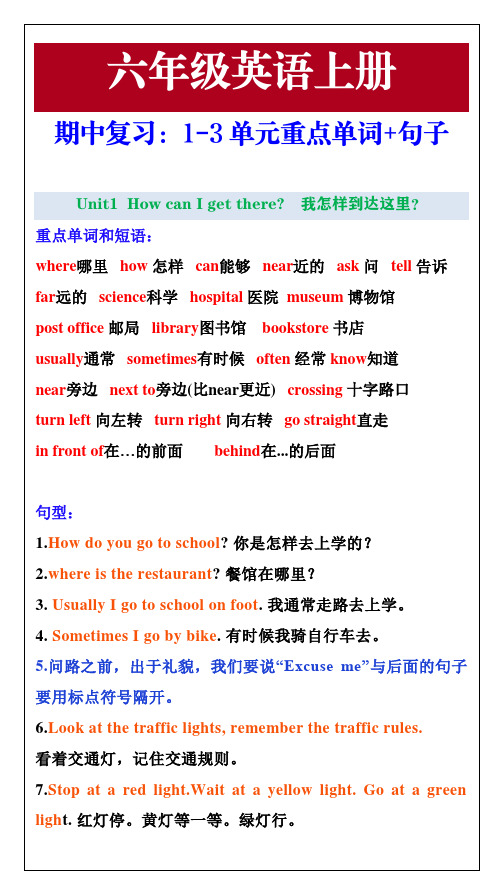
重点单词和短语:
by bike骑自行车by bus坐公车by train坐火车
by plane坐飞机by ship坐轮船by subway坐地铁
by taxi乘出租车on foot= walk走路excuse me打扰一下
please请buy买want to想要a pair of一双get on上车
next week下个星期tomorrow明天tonight今晚busy忙碌的
go home回家post card明信片comic book漫画书
newspaper报纸dictionary字典plant trees种树
句型:
1.---What are you going to do tomorrow?你明天打算做什么?
get off下车turn left左转turn right右转am上午pm下午
now现在look for寻找top停止wait等待get to到达
driver司机must必须
句型:
1.Let's go to the nature park.让我们一起去公园吧!
2.——How do we get there?我们怎样到达这里?
---I'm going to have an art lesson.我要上美术课。
--We are going to draw some pictures in Renmin Park.
我要到人民公园去画画。
2、--Where are you going?你们打算去哪儿?
-- We are going to the cinema.我们打算去电影院。
usually通常sometimes有时候often经常know知道
六年级英语上册期末复习宝典(1)
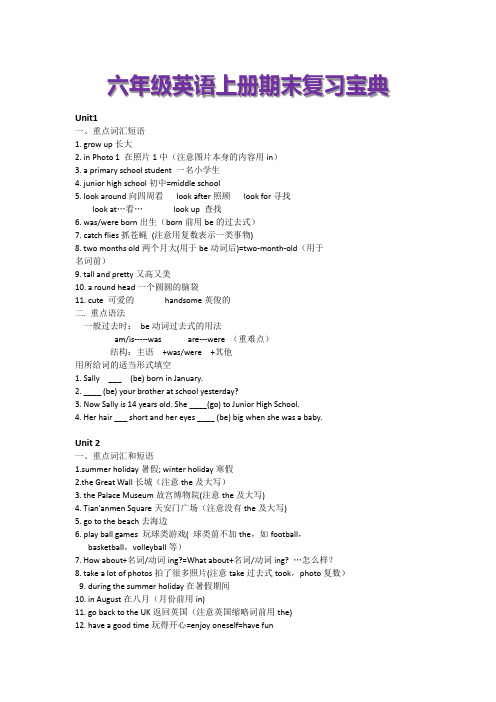
六年级英语上册期末复习宝典Unit1一、重点词汇短语1. grow up长大2. in Photo 1 在照片1中(注意图片本身的内容用in)3. a primary school student 一名小学生4. junior high school初中=middle school5. look around向四周看look after照顾look for寻找look at…看…look up 查找6. was/were born出生(born前用be的过去式)7. catch flies抓苍蝇(注意用复数表示一类事物)8. two months old两个月大(用于be动词后)=two-month-old(用于名词前)9. tall and pretty又高又美10. a round head一个圆圆的脑袋11. cute 可爱的handsome英俊的二. 重点语法一般过去时:be动词过去式的用法am/is-----was are---were (重难点)结构:主语+was/were +其他用所给词的适当形式填空1. Sally ___ (be) born in January.2. ____ (be) your brother at school yesterday?3. Now Sally is 14 years old. She ____(go) to Junior High School.4. Her hair ___ short and her eyes ____ (be) big when she was a baby.Unit 2一、重点词汇和短语1.summer holiday暑假; winter holiday寒假2.the Great Wall长城(注意the及大写)3. the Palace Museum故宫博物院(注意the及大写)4. Tian'anmen Square天安门广场(注意没有the及大写)5. go to the beach去海边6. play ball games 玩球类游戏( 球类前不加the,如football,basketball,volleyball等)7. How about+名词/动词ing?=What about+名词/动词ing? …怎么样?8. take a lot of photos拍了很多照片(注意take过去式took,photo复数)9. during the summer holiday在暑假期间10. in August在八月(月份前用in)11. go back to the UK返回英国(注意英国缩略词前用the)12. have a good time玩得开心=enjoy oneself=have fun13. stay with sb.跟某人待在一起14. in the countryside在乡村15. last Sunday上周日(last...是一般过去时标志)16. How is...? …怎么样?二. 重点语法一般过去时:含有be 动词的一般疑问句,否定句和特殊疑问句am/is-----was are---were (重难点)结构:Was/Were +主语+其他?主语+was/were not+其他.特殊疑问词+一般疑问句?三、习题1.I was a baby ten years ago.(变为否定句)2.My friends were at home yesterday.(变为一般疑问句)3.They were students 2 years ago.(变为否定句)4.We were happy the day before yeaterday.(变为一般疑问句,并做肯定回答和否定回答)Unit3一、词汇短语1. this morning今天早上(一般是过去时标志)2. two hamburgers两个汉堡3. some cola一些可乐4. --What did you have for breakfast?(注意介词for)--I had…for breakfast.5. should应该,情态动词,后加动词原形6. have a little meat / sweet food 吃一点肉/甜食(注意a little修饰不可数名词)7. have too much meat吃太多肉(注意too much修饰不可数名词)8. have breakfast 吃早餐9. healthy ---unhealthy (un否定前缀=not)10. strong and healthy 健康又强壮11. play sports 做运动12. fat and unhealthy 又胖又不健康13. have poor/good eating habits 有不好/好的饮食习惯14. fish and chips 炸鱼薯条15. in the UK 在英国16. 可数:hamburger; vegetable; egg; pie; sandwich; noodle;不可数: cola; fruit; meat; bread; milk; pizza; rice; fish;chicken; sweet food; candy; ice-cream; chocolate;17.肯:I had breakfast this morning.否:I didn’t have breakfast this morning.一般疑问句:Did you have breakfast this morning?肯定/否定回答:Yes, I did./ No, I didn’t.二. 重点语法一般过去时:含有实意动词的动词过去式:直去双改特殊记结构:主语+V过去式+其他Did+主语+V原+其他?特殊疑问词+一般疑问句?三、习题1. Tom can have a little meat, but not _______.A. too manyB. many tooC. too muchD. much too2. What did you have____ lunch yesterday.A. onB. atC. inD. for3. We________(should/should not) have breakfast.4. Judy ate some fish.(对划线部分提问)_____________________________________________5. They took a lot of pictures in the Palace Museum.(变否定句)1-3单元复习1.In the photo, Alice in London. She had a good time there.A. isB. wasC. went2. Jim stayed with his sister in Beijing the winter holiday.A.onB. atC. during3. How your weekend? Where you go?A.did, wasB. was, didC. were, did4. The frog in the river.A.bornB. is bornC. was born5. Don’t drink coffee. It’s not healthy.A.too muchB. much tooC. so many6. Joe is eight years old now. He goes to .A. primary schoolB. middle schoolC. junior high school按要求改写下列句子:1.Tom was born in 2011. (对画线部分进行提问)?2. They spent their holiday in London. (对画线部分进行提问)?3. Lily and Ben saw an old friend yesterday. (变为否定句)?答案:选择:1-6 BCBCAA句型: 1. When was Tom born?2. Where did they spend their holiday?3. Lily and Ben didn’t see an friends yesterday.Unit41. last weekend上周末2. play with...和...玩(play with Tom/fire)3. the Greens(格林一家)the+姓氏的复数表一家人4. the US=the USA=America美国5. play chess下棋6. in my home在我家(in表示在房子范围内,at表示在家这地点)7. the UK英国8. play table tennis=play ping-pong ball打乒乓球9. be from=come from来自10. in the forest在森林11. in the tree落在树上on the tree长在树上12. make a lot of noise制造很多噪音13. stop doing sth.停止干什么14. dig a hole挖一个洞15. have a good sleep睡个好觉16. talk to sb.跟某人说话17. say hello to sb.跟某人打招呼18. know...well很了解......本单元重点句型:1.学会用Did you…?询问对方过去是否做了某事?2.学会Yes, I did./ No, I didn’t.做肯定或否定回答习题1. —Where ____ you last weekend?—I ____ at school.A. were; wereB. were; wasC. was; wereD. was; was2. kitty ____her room yesterday.A. cleanB. cleansC. cleanedD. cleaning3. Ben _____ a good sleep last night.A. haveB. hadC. hasD. having4. Please stop noise in class.A.makesB. makingC. made5. do many rabbits sleep? –In hole.A.WhatB. HowC. Where6. – Did the rabbits a hole?– Yes, they a hole yesterday.A. dig, digB. dug, digC. dig, dug选择题的答案:1-6: BCBBCC句型题-连词成句1.see, you, did, them, morning, this(?)?2. your, who, neighbours, are(?)?3. many, today, sleep, rabbits, holes, in(.). 句型题的答案:1.Did you see them this morning?2.Who are your neighbours?3.Today many rabbits sleep in holes.Unit51. in danger 处于危险中2. in the past 在过去(一般过去时的时间标志)3. in the wild 在野生环境中4. South China tigers 华南虎5. blue whale 蓝鲸6. six hundred 六百(区别:hundreds of)7. on one‘s way home 在某人回家的路上on one’s way to school 在某人去学校的路上8. take care of=look after 照顾9. go for a walk 去散步10. drive...away 把...赶走11. grow up 长大12. learn a lot 学到很多(区别:a lot of +名词)13. send (sent)...back to ... 把...送回到...14. three years later三年后(整篇文章是过去时,则用于过去时)15. be happy to do sth. 很高兴做某事...16. help them all 帮助他们所有人17. in the jungle 在丛林中18. oo发音:k,d之前oo短,food foot恰相反19. What can we do to help them? 我们能帮助他们做些什么?本单元重点句型:学会用in the past, there were…句型描述某种事物过去的数量。
六年级英语-上册复习资料(1)

人教版(PEP)小学英语总复习六年级上册知识点Unit 1 How can I get there ?一、主要单词:museum博物馆bookstore书店cinema电影院turn 转弯hospital医院left向左post office 邮局science科学right向右straight笔直地crossing十字路口二、习惯语搭配:post office邮局science museum科学博物馆pet hospital宠物医院Italian restaurant意大利餐馆Beihai Park北海公园Palace Museum故宫博物院go straight直走turn right/left右/左转next to挨着in front of。
..在。
.。
前面near the park在公园附近on Dongfang Street在东方大街上三、惯用表达式:Excuse me 打扰一下Follow me, please!请跟着我!四、公式化句型:1、问路的句型及其答语:问句:Where is the + 地点? ···在哪儿?答语:It’s + 表示地点的词语。
它在···。
例句:where is the cinema?It’s next to the bookstore。
2、询问怎么到某地的句型及其答语:问句:How can +主语+ get (to)+地点?···怎么到···?例句:How can I get to the bookstore?同义句型:Can you tell me the way to +地点?Where is + 地点?Which is the way to +地点?答语:Turn +方向+表示地点的介词短语。
···转.例句:turn right at the hospital.五、例句:Where is the cinema, please?请问电影院在哪里?It's next to the hospital. 它与医院相邻。
六年级英语上册重点单词句型语法复习资料
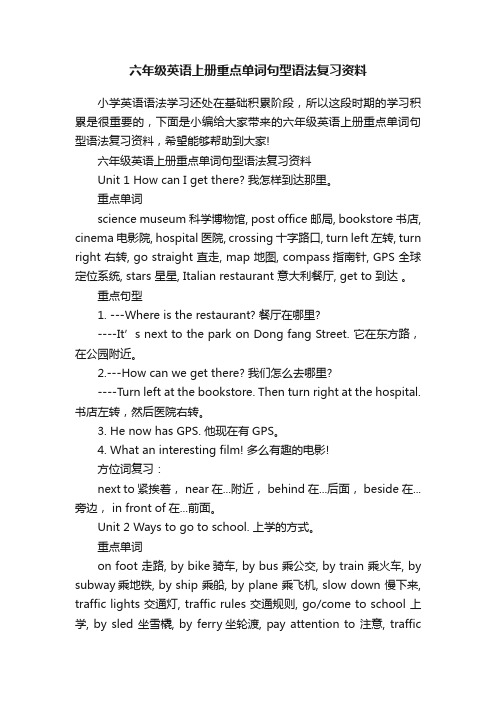
六年级英语上册重点单词句型语法复习资料小学英语语法学习还处在基础积累阶段,所以这段时期的学习积累是很重要的,下面是小编给大家带来的六年级英语上册重点单词句型语法复习资料,希望能够帮助到大家!六年级英语上册重点单词句型语法复习资料Unit 1 How can I get there? 我怎样到达那里。
重点单词science museum 科学博物馆, post office 邮局, bookstore书店, cinema电影院, hospital 医院, crossing 十字路口, turn left 左转, turn right 右转, go straight 直走, map 地图, compass指南针, GPS 全球定位系统, stars 星星, Italian restaurant 意大利餐厅, get to 到达。
重点句型1. ---Where is the restaurant? 餐厅在哪里?----It’s next to t he park on Dong fang Street. 它在东方路,在公园附近。
2.---How can we get there? 我们怎么去哪里?----Turn left at the bookstore. Then turn right at the hospital.书店左转,然后医院右转。
3. He now has GPS. 他现在有GPS。
4. What an interesting film! 多么有趣的电影!方位词复习:next to紧挨着, near在...附近, behind在...后面, beside在...旁边, in front of在...前面。
Unit 2 Ways to go to school. 上学的方式。
重点单词on foot 走路, by bike骑车, by bus 乘公交, by train 乘火车, by subway乘地铁, by ship 乘船, by plane 乘飞机, slow down 慢下来, traffic lights 交通灯, traffic rules 交通规则, go/come to school 上学, by sled 坐雪橇, by ferry坐轮渡, pay attention to 注意, trafficlights交通灯, Stop and wait at a red light 红灯停等一等, slow down and stop at a yellow light 黄灯减速并停下, Go at a green light 绿灯行。
小学英语语法--六年级毕业复习练习题(1)
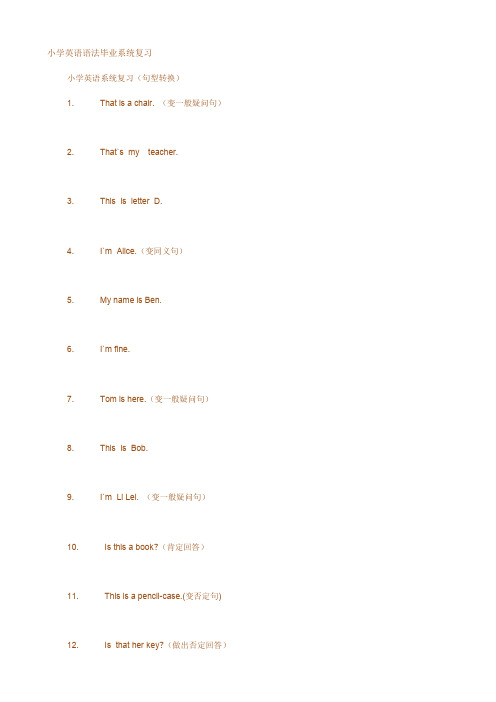
小学英语语法毕业系统复习小学英语系统复习(句型转换)1. That is a chair. (变一般疑问句)2. That`s my teacher.3. This is letter D.4. I`m Alice.(变同义句)5. My name is Ben.6. I`m fine.7. Tom is here.(变一般疑问句)8. This is Bob.9. I`m Li Lei. (变一般疑问句)10. Is this a book?(肯定回答)11. This is a pencil-case.(变否定句)12. Is that her key?(做出否定回答)13. This is a pen in English.14. It is an English book.15. This is my book.(复数).16. Is that a cat.(复数)17. Is that a cat?主(变复数)18. His baseball is under the table. (变一般疑问句)19. I go to school by bike.20. I often go hiking on the weekend. (变一般疑问句)21. She is drawing a picture now.22. Is the cat eating fish?(肯定回答)23. I went to guangzhou last week.24. Jim planted trees yeeterday.25. It was sunny yesterday.(变否定句)26. The apples are five yuan.27. There is a T-shirt in the box.(变复数句)28. My mem cleans the room every day.(变否定句)29. Peter is going to fly a kite next Sunday.30. My bag is red.31. This shirt is very nice.(变为否定句)32. What`s the matter?(变同义句)33. Tom is tall,but denny is short.(改为比较句)34. He goes to work by bike.35. We are going to go hiking this Friday.36. I like white best.37. We are going to shanghai38. She is washing the clothes.39. The pens are in the pencil-case.40. He`s going to the Great Wall.(变否定句)41. It is an elephant.42. Miss Xu is a good teacher. (变一般疑问句,肯定回答)43. It`s our flag.44. The young girl is my sister.45. My name is Alice.46. She didn`t do homework yesterday.(变为肯定句)47. I`m from China.48. Tom is cleaning the classroom. (变一般疑问句)49. She often washes the clothes. (变一般疑问句)50. These are maps.(变为单数)51. This is a beautiful bee.52. Is there a book in the deak?(变成复数句)53. There are four chairs in the dinning room.54. Can you play football?(否定回答)55. Xiao ming likes drawing. (变一般疑问句,否定回答)56. My mother works in a hospital.57. Ma Na`s uncle live in beijing.58. They walk in the street every evening.59. I often go swimming on Sundays.60. Mark doesn`t like playing the piano.61. Is your father going to see your uncle?(变肯定句)62. The children are going to the zoo next weekend.63. I did my homework yesterday evening.64. Miss Li saw the boy this morning.(变一般疑问句)65. Lily ang Lucy went ice_skating yesterday.66. It`s seven o`clock.67. I can see three pencils in the pencil-case.小学英语系统总复习(代词)一、写出下列单词的正确形式:宾格形容词性物主代词名词性物主代词I ————————————————you ————————————————he ————————————————she ————————————————it ————————————————we ————————————————they ————————————————二、根据汉语提示,用人称代词的适当形式填空:1.————(我) am a teacher .2. ————(她) is eleven years old.3. ————(他) studies in NO.1 primary School.4.————(我们) have English ,mach, Chinese today.5.________ (它) is a map of China.6.Mr Brown help ________(我)wash the car.7. I saw ________ (你) in the bookstore yesterday.8. Please give_________ (他) an English book.9.The blue bike is ____________(我的)。
小学六年级英语复习资料句型及练习

陈述句 (一)陈述句的肯定式 陈述句的肯定式有以下两种形式: 1.主语+系动词+表语 2.主语+谓语+其他成分 (二)陈述句的否定式 陈述句的否定式有以下四种形式: 1.谓语动词是be 动词时,由“be+not ”否定形式。
2.词时,由“do /does/did+not ”构成否定形式。
3.谓语为“助动词/情态动词+实义动词”时,由“助动词/情态动词+not ”构成否定形式。
4.有些陈述句的否定式是用no ,nothing ,nobody 等表示否定意义的词构成的。
Nobody is in.没有人在家里。
疑问句 (一)一般疑问句 1.一般疑问句的肯定式 一般疑问句可以用肯定词yes 或否定词no 回答,朗读一般疑问句时用升调。
根据其谓语动词的区别,一般疑问句的肯定式有两种。
(1)谓语动词为be ,have ,助动词或情态动词时,一般疑问句中把谓语动词be ,have ,助动词或情态动词提到句子开头。
(2)谓语动词为实义动词时,一般疑问句的形式为“do /does/did+主语+动词原形”。
特殊疑问句是对句子中某一部分提问的疑问句。
常用疑问词what,who,whose,which,when,why,where,ho w 等引导。
特殊疑问句不用yes 或no 回答,而是要根据实际情况进行回答。
朗读特殊疑问句时通常用降调。
根据特殊疑问句在句子担当成分的不同,特殊疑问句的结构形式可分为两种。
1.一般情况下,特殊疑问句由“疑问词+一般疑问句”构成。
What do you do at home?你在家做什么?Which color do you like?你喜欢哪种颜色?2.疑问句作主语或主语的定语时,特殊疑问句词序与陈述句相同。
Who cooks meals in your home?你家里祈使句 一、祈使句的定义 祈使句是用来表示请求、命令、劝告、建议等的句子。
祈使句习惯上常常省略主语(以动词开头的句子),句末用感叹号或句号,朗读时一般用降调。
六年级复习_PEP小学英语重点句型语法总结
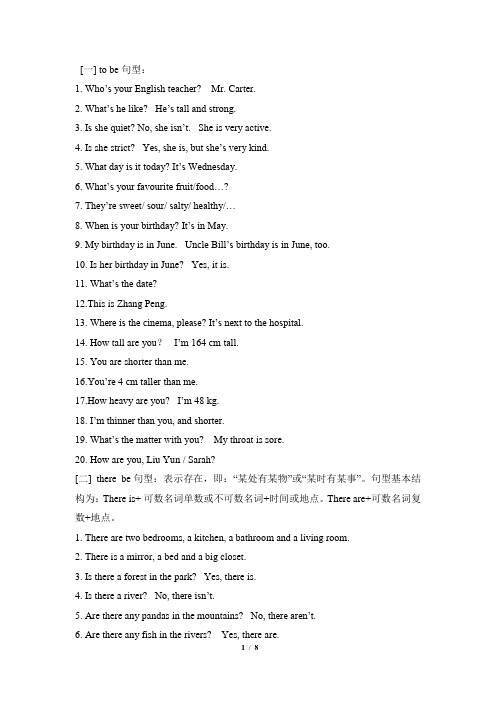
[一] to be句型:1. Who’s your English teacher?Mr. Carter.2. What’s he like?He’s tall and strong.3. Is she quiet? No, she isn’t.She is very active.4. Is she strict? Yes, she is, but she’s very kind.5. What day is it today? It’s Wednesday.6. Wha t’s your favourite fruit/food…?7. They’re sweet/ sour/ salty/ healthy/…8. When is your birthday? It’s in May.9. My birthday is in June. Uncle Bill’s birthday is in June, too.10. Is her birthday in June? Yes, it is.11. What’s the date?12.This is Zhang Peng.13. Where is the cinema, please? It’s next to the hospital.14. How tall are you?I’m 164 cm tall.15. You are shorter than me.16.You’re 4 cm taller than me.17.How heavy are you? I’m 48 kg.18. I’m thinner than you, and shorter.19. What’s the matter with you?My throat is sore.20. How are you, Liu Yun / Sarah?[二] there be句型:表示存在,即:“某处有某物”或“某时有某事”。
六年级上册英语句子表_小学英语句型

六年级上册英语句子表_小学英语句型从小学开始学习英语,就应该多读多多背,增强自己对英语的吸收,今天店铺在这里为大家分享六年级上册英语句子表,欢迎大家阅读!六年级上册英语句子表篇一Unit 1 How do you go there?1. --- How do you go to school? 你怎么去上学?--- Usually I go to school on foot. 通常我步行去上学。
--- Sometimes I go to school by bike. 有时我骑自行车去上学。
2. ---How can I get to the zoo? 我怎么到达动物园? ---You can go by subway. 你可以乘地铁去。
3.--How can I get to Zhongshan Park?--- You can go by the No.15 bus.4. Look at the traffic lights.5. Remember the traffic rules.6. Stop at a red light.7. Wait at a yellow light.6.Go at a green light.7.--Where is your home?---My home is near the post office.Unit 2 Where is the science museum?1.. ---Excuse me. Where is the library?--- It’s in front of the school.2.---Excuse me, is there a cinema near here?---Yes ,there is ./No, there isn’t.3.--Where is the cinema?. ---It’s next to the hospital.4.---Is it far from here?---No, it’s not far.5. I want to buy a pair of shoes.6.---How can I get to the bank?---You can go by No.15 bus.7.Get off at the post office.8. --- Go/Walk straight for three minutes.六年级上册英语句子表篇二1.Easy come,easy go.来的容易,去得快2.Time and tide wait for no man.时间不等人3.Every dog has his day.人人都有得意时4.If winter comes,can spring be far behind.冬天来了,春天还会远么5. Try not to become a man of success but rather try to become a man of value. -- A. Einstein不要为成功而努力,要为做一个有价值的人而努力。
小学人教版六年级英语上册复习要点

小学人教版六年级英语上(Shang)册复习要点Unit1 How can I get there?一(Yi)、重点单词:地(Di)点:science museum科学(Xue)博物馆 post office 邮局 bookstore 书店cinema 电影院 hospital 医院动(Dong)作:go straight 直(Zhi)走 turn left/right 左转、右转方(Fang)位: in front of :在(Zai)···前面 behind 在···后面near在…旁边 next to 紧挨着 beside 在旁边over 在…上方 on the left 在左边 on the right 在右边二、重点句型:(1)Is / Are there…?某处有某物吗?肯定回答:Yes, there is/are. 否定回答:No, there isn’t/aren’t.(2)Where is the + 地点? ... ... 在哪里?It’s + 表示地点的名词. 它... ...例句:Where is the cinema? 电影院在哪?It’s next to the bookstore. 在书店的旁边。
(3)How can + 主语+get(to)+ 地点? ... ...怎么到... ...?(如果get后面接的词为副词,则要省略介词to.)例句:How can we get to the park?How can we get there? 我们怎么到那儿?同义句型:Can you tell me the way to + 地点?( 4 )Where is + 地点? Which is the way to + 地点?( 5 ) Turn left at the bookstore. 到书店左转。
Unit 2 Ways to go to school?一、重点单词/短语:交通方式:by bike /bus /plane /subway /train /ship /taxi /ferry骑自行车/乘公共汽车/飞机/地铁/火车/船/出租汽车/轮渡take the No.57 bus 乘57路公共汽车on foot 步行其他:slow down慢下来 pay attention to 注意 traffic lights 交通信号灯 look right 向右看 cross the road 横穿马路 at home 在家二、重点句型:(1)How do you + 地点?你们怎么来... 的?I usually/ often/sometimes .. ... 我通常/经常/有时...How do you go(to) + 地点?你们怎么去...的?How do you get (to) + 地点?你们怎(Zen)么到达...的?(频度副词:频度副词又称频率副词,用来表示事情发(Fa)生的频率,即某事多主语 + must + 动词原(Yuan)形 + (其它)(must和(He)can, should一样都是情态动(Dong)词,must意(Yi)思是“必(Bi)须”,语气很强烈,没有人称和数的变化,后面接动词原形。
- 1、下载文档前请自行甄别文档内容的完整性,平台不提供额外的编辑、内容补充、找答案等附加服务。
- 2、"仅部分预览"的文档,不可在线预览部分如存在完整性等问题,可反馈申请退款(可完整预览的文档不适用该条件!)。
- 3、如文档侵犯您的权益,请联系客服反馈,我们会尽快为您处理(人工客服工作时间:9:00-18:30)。
小学六年级英语句子复习(一)WhatWhat’s your name?What’s in the picture/ your schoolbag/ your pencil-case/ the classroom?What do you like? What’s your father?What would you like?What’s this?What’s his /her name?What about you?What are you going to buy?What does he like to do?What’s your hobby?What are you going to be?What should we do then?What time is it?What does she do?What colour is it?What are they?What are you doing?What’s the weather like in Beijing?What’s the matter?What size?What do you see in the picture?What are these?What do you do on the weekend? What’s your favourite season?What’s the weather like in spring? What would you like to do/eat?What is Zip’s favourite season? What’s the date today?What are they?What’s she doing?What are they doing?What is it doing?What are the ducks doing?What do ants like to eat?What do you have?What are you reading?What’s that?What do you do when you have the flu? What did you buy?What did you do last weekend?What about grapes?What do you want to do? What’s in that tiny seed? What’s he/she/it like? What day is it today? What do you have on Thursday? What do you do on weekends? What’s your favourite day/food/fruit? What can you /he /she /it do?What can Mike do in the four seasons in Canada?What does she/ he /your father/ your mother do?What are you going to do after school/ this weekend/ this evening /this afternoon? HowHow are you?How about you?How old are you?How many candles balloons /books /gifts are there?How do you go to school /Canada?How about by taxi?How can I get to Zhongshan Park /the zoo? How do you go there?How does he go to school/ work?How does the water become vapour?How do you do that? How heavy/ tall /old are you?How big are your feet?How long are your legs?How large is your room?How long is your bed?How do you plant a tree?How many students are there in your class? How much is it/are they?How many horses/bears are there?How many cows/ apples do you have? How do I look?How about this pair?How does Amy feel? How many kites can you see? WhoWho’s there?Who is wearing yellow today? Who are you?WhereWhere is my seat/the trash bin/ your pen? Where is your mouth? Where are the keys/ my shoes/ they?Where is your home /hospital/ cinema/ bookstore /library/ museum /shoe store? Where are you going tomorrow? Where do they live?Where does he work?Where does the rain /cloud/ vapour/ flower come from?Where is the canteen/library/ art room? Where is my T-shirt/ my car? Where did you go on your holiday? Where are you from?WhoWho’s your friend/principal/he? Who’s your math teacher? Who are you?Who has a birthday in October? Who is taller than you? Who is heavier than you? Who’s that woman?WhichWhich floor?Which is mike’s times table? Which season do you like best? Which season does Zhangpeng like best? Which monkey do you like?Which monkey is stronger?Whose Whose is it/this/that?WhenWhen do you get up? When is children’s day? When do you do morning exercises /eat breakfast/ go to school?WhyWhy do you like spring? Why not?IsIs she in the study?Is there a cinema near here?Is it far from school?Is your pen pal a boy or a girl?Is this the library/TV room/teacher’s desk /your bedroom/ your aunt? Is that a picture?Is your birthday in February?Is he watching ants?Is she your sister?Is she/he young/kind/strict/active/quiet/old?AreAre they nice/ sheep/ all right? Are those cucumbers? Are you under the table? Are you helpful at home?Are there any bridges in your village? CanCan I have some chicken/ a Coke? Can I go on foot?Can you go by ship or train?Can he go with us?Can you help me go up to the sky? Can I have a try? Can I wear my T-shirt?Can I help you?Can I ask your some questions?Can tigers swim?Can you read this/play football/do housework? Can I have an apple, please?DoDo you like sports/ pears/apples? Do you know the traffic rules? Do you have lunch at school? Do you want to be my friend?Does he go to school by car? Does he live n the country? Does she teach English?Does she have a computer?Did you go at night?Did you go to the park?Did you help them clean their room?Do you have a comic book/ a library/any new teachers ? May May I have a look?Would Would you like some grapes?。
